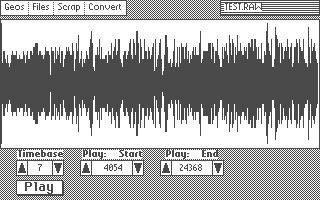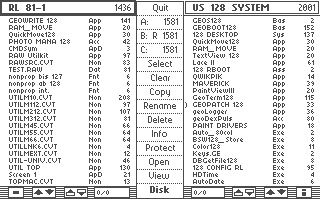I sold all my CBM equipment in summer 2000, so all you will see here is at a final state and won't be developed any longer!
During my studies I'd got plenty of spare time, so I started programming for GEOS 64/128 in assembler with the "Mega Assembler", the german counterpart of the geoProgrammer.
This is what I've done and thought about so far.
Project TextView128
The only project, which is finished until now. It's a text viewer for GEOS128 running on the 80 col. screen. You all know TextView for the 40 col. screen - this is the 80 col. counterpart.
The screen shows 80x25 characters and all texts are shown in a non-proportional font. You can choose between an US and a german font and you can select files from up to four drives.
Status: finished
Downloads:
Project RAW-util
RAW-util is a sound tool. You can load, save and play RAWs, change their speed and cut/copy/paste parts of the RAW in memory. RAWs are presented by a graphical interface in which you can work on it.
The final version should also be able to convert WAVs and VOCs to RAW.
Look at the screenshot:
The RAW-UTIL screen with a loaded RAW-file. You got the same menus as every GEOS application (Geos/Files) plus some additional menus.
In the graphics-area you'll see a picture of the RAW data in memory. You can change start and/or stop address to play from/to or to save from to via the control-boxes at the bottom. And you can set the speed of playing.
In future versions you can cut/copy/paste parts of the sample and convert from WAV or VOC
What you don't see, are the sprite-marks for start, end and current position in the sample.
Status: GUI, RAW part implemented, development stopped
Downloads:
Project UtilTop
UtilTop was thought as a DeskTop replacement like NortonCommander for DOS.
It implements two file-windows and a button-bar in the middle with several functions to be done for selected files.
I begun working on it in the late 80's and passed some preliminaries around. I stopped development when DualTop entered the scene, as this seemed to be a twin of my program.
Some routines of UtilTop are still in use by some programs running under RAM-Process - specially those, made by Erwin Schnabel.
The UTIL TOP screen with the file menu. Two windows for two drives and a button-bar at the middle. The top will show the diskname and the number of free blocks on disk. Files are shown with name, type and size in diskblocks.
The bottom presents some buttons: quit/info, scroll up/down (1 file), scroll up/down (1 page), selected files/blocks
With the middle button-bar you choose actions on selected files
Further screenshots...
Status: Development stopped
Downloads:
Project Dynamic memory
In need of more memory for bigger projects under GEOS (look at the next projects) and inspired by an article from Craig Bruce (C=Hacking #2) I decided to develop either a relocatible library or just source files with routines for dynamic memory allocation.
Status: internal memory and REU implemented (sources), development stopped
Project Video Fossil
Although I love the GUI of GEOS 64/128, there sometimes is a need of just a commandline to input some commands or to output just some debugging information or something else.
Under MS-DOS there's already a standard for it: VFOSSIL, used by many Terminalprograms (specially under OS/2) like BinkleyTerm ...
It implements a cursor-like movement on a virtual, line oriented screen and implements ANSI too.
So I decided to implement a "virtual" screen for GEOS - just initalize it by passing height and width and memory-base (VIC/VDC) and put and get characters via some controlling routines
Status: Basic controls, input and output implemented (VDC), development stopped
Project Fossil
Wouldn't it be nice to have a library or sources files to communicate with serial devices like modems under GEOS? No need to know what interface is connected (userport, SwiftLink, Turbo232 ...), just issueing commands to the serial device...
This library is ispired by some articles by Ilker Ficikilar (commlib2) and Craig Bruce (swiftlib) and some other guys.
As a plus I decided to implement the library after the FIDONet standard called FOSSIL (fsc-0015). This includes all buffer handling, standard control routines ...
It should be easy then, to port some MS-DOS applications based on FOSSIL technique to GEOS 64/128.
Status: SwiftLink/Turbo232 handling implemented (64/128), Extended device detection, development stopped
Downloads:
Project Mailer/Pointprogramm
Based on the FOSSIL and VFOSSIL projects this should be a first test for both of it.
While looking through the BinkleyTerm sources, I decided to port them to GEOS 64/128. This imlements a lot of FIDONet standards and is based upon the FOSSIL and VFOSSIL packages.
This will start some other activities, since a standalone mailer makes no sense, so at least a tosser (like SQUISH) and a ticker (like ALLFIX) should follow...
Status: Basic porting under development, rest paused, as this is based on two project that are not finished yet
Project DoubleWord
While working on project dealing with PC technique, it is a must to implement some routines that deal with 32 bit values.
Status: Basic DoubleWord routines implemented as macros for MegaAss (Add, Sub, Move, Rotate), development stopped
Downloads:
Project PPP/SLIP Dialer/Project TCP/IP stack
If the FOSSIL is finished, there should be a possibility to implement some networking techniques along with it.
As most ISP nowadays only use PPP, that should be the most common technique today (according to STD 0051). Once the physical layer (OSI layer model) is done, one has to implement the following layers IP (STD 0005) and it's control protocol IPCP (RFC 1332) and TCP (STD 0007) until we have what one will call a socket. Based on that, the standard services have to be implemented (PING, FTP, TELNET, RSH, ...).
This will be the most complex project, so don't expect it to be finished tomorrow ;-)
(All STDs, RFCs provided by InterNIC, the internet's standard comittee)
As this imlements most of the projects above (DoubleWord, FOSSIL, VFOSSIL, Dynamic Memory) development will take a long time...
Status: FCS16, HDLC implemented, concepts for TCP/IP and clients, development stopped
Downloads:
Project 64Net/2
While using the commercial version of 64Net for a long time under GEOS, I stumbled across the new, free version of 64Net(/2) and it's sources that came along with it. It seems to have more power than the old 64Net version (several filesystems, internet filesystem...) but uses an other cable and some other routines to connect to the C64/128.
Unlikely, there are no disk-drivers for GEOS and the support is not much because of a HD crash of the author. He tries to recover all of his sources and meanwhile I decided to port that to OS/2 and then have a look at the new communication parameters to pass to it and write some driver routines around it ;-)
Status: Development stopped
Symbols and macros im using with MegaAss
| Page last modified: 2021-10-03 - Content last updated: 2004-12-13 - © 2004-2021 by geogus |

